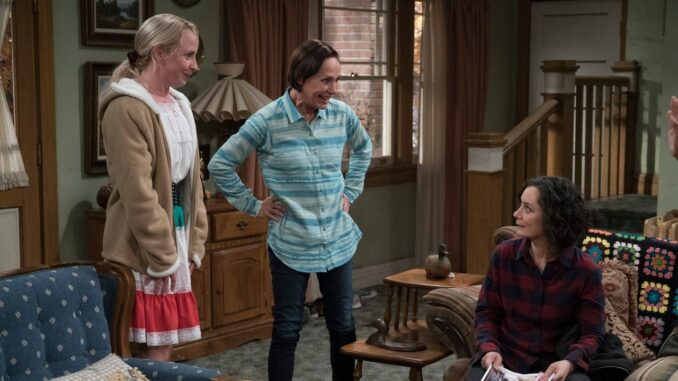
The grenades exploding in the ‘Roseanne’ cultural war are far louder than any talk about whether the show is any good. This week’s episode was superb. Does that matter?
Adam Rose
That harmonica, the one that soundtracks the Roseanne theme song, crescendoing to that piercing cackle from its titular star, used to herald joy. Comedy. A half hour of family fun.
Now, that harmonica is a warning siren. Take shelter: Roseanne—nay, Roseanne—is coming.
Roseanne Barr’s political views and Roseanne Connor’s cultural legacy are two storm fronts perfectly colliding, a weekly phenomenon at this point so reliable it’s as if predicted by the Farmer’s Almanac.
It was Tuesday night, and that meant for the third week that harmonica, that siren, wailed. But for the first time since the lightning-rod revival started airing two weeks ago, it may have been a false alarm. “Eggs Over, Not Easy,” Tuesday night’s episode, was maybe the strongest outing from the Roseanne reboot yet: salty, sweet, cohesive, and true to the characters as we knew them 20 years ago and yet believable in their advancement today.
It also, as it happens, was almost entirely stripped of politics, hot-button social issues, and riling jokes, the kinds that have designated the blockbuster revival as grounds for our latest culture wars. But with guns firing and hot-take grenades being flung anyway, does the fact that an episode of Roseanne was merely very good, that it might justify the value of a reboot, actually matter?

The episode focused heavily on a storyline that was introduced in the revival’s pilot. Becky (Lecy Goranson) was gearing up for a major step in her plan of being a surrogate mother for Andrea (Sarah Chalke), a plan which she is slightly deluded about—she is 43 years old, and lied about her age to Andrea—and of which Roseanne strongly disapproves.
But at her doctor’s appointment, Becky learns that her blind optimism can’t yield medical miracles. Not only is being a surrogate for Andrea out of the question, she has less than a 5 percent chance of ever getting pregnant. What had been fodder for clever jokes about Becky’s denial suddenly becomes the harsh reality of a woman whose husband died before they could have kids and, because she took too long to move on, will never be able to have biological kids of her own.
(Glenn Quinn, who played Becky’s husband, Mark, in the original series died of an overdose in 2002, and the actor’s death was written into the plot when Roseanne rebooted earlier this month.)
It’s a poignant story arc. That harmonica might get you in the mood for comedy. Lately, it might be the referee’s whistle blow, signalling the start of another skirmish in a vicious culture war. But it can also be melancholy, reflecting the real emotions the series has never shied away from exposing and letting just linger out there, unresolved, just like in life.
In the aftermath of the news, Becky and Roseanne have a brutal fight, with Roseanne torn between wanting to comfort her and say told-ya-so, but Becky still bitter that she never supported her surrogacy in the first place. Nasty words are said. The complicated mother-daughter relationship is explored: pride, egos, delusion, stubbornness, compassion, saying-the-wrong-thing regret, grudges…it’s all funny when barked through the sharp dialogue and shrill delivery of Roseanne and her grounded foil in Becky. But it strikes a deep emotional chord as well.

It’s a reminder that since the revival premiered (thus far, four episodes have aired), the strength of the series has been in the ways the rest of the Connor clan has used the setting of that indelible house, living room, and kitchen as a familiar center from which to work through their struggles. Roseanne, think what you may of how she was introduced (as a Trump voter), has been an observer on the side, albeit an active one, as they grappled with disappointment over their lots in life and loss of potential, financial woes, parenting issues, gender confusion, motherhood struggles, and, yes, political angst.
Presumably that was going to be the value of this show. An airing of the volatile conversations we’re having around the country, but from the the iconic Conner family couch, a supposed safe zone from which we can parse the issues. That safe zone is now littered with landmines. And yet, as Roseanne breaks ratings records, it’s one of the most traversed areas in pop culture. Now what are we supposed to make of it?
It would be naive at this point to think that minds might be changed about this revival and the responsibility of giving Roseanne Barr this kind of exposure. We won’t say platform, because this revival is not a megaphone for her beliefs. It was shepherded to screen in large part by Sara Gilbert, who happens to be
a lesbian and a liberal in addition to playing Darlene, and boasts Whitney Cummings as showrunner, a comedian whose progressive politics are practically tattooed on her arms.
As has been written about already, there was much hullabaloo about Roseanne Conner voting for Trump, but the revival has never mentioned his name. And though the premiere centered around political debate, it’s been pretty uniformly ruled a depiction of a reality for the Connor family that, whether they voted for Trump or not, is pretty bleak because of the Donald’s administration.
But that’s not the point. The point is that the show’s reception has been so volatile and precarious that it mostly exposes ABC for its naivete and mishandling of the show’s launch. That the network has been so opaque in which aspects of Barr’s outspokenness it is embracing and which it is condemning—she’s reportedly been forced to delete deplorable and offensive tweets, but the network isn’t exactly bemoaning the ratings the attention on her is bringing.
A confusingly tone-deaf joke from last week’s episode in which Roseanne mocked and dismissed the network’s sitcoms centered around minority families—Black-ish and Fresh Off the Boat—sent the message that the network is happier to bask in Roseanne’s controversial and polarizing success than support the groundbreaking work done by those sitcoms to revitalize and rebirth ABC’s own image and reputation.
With Black-ish creator Kenya Barris reportedly looking to follow fellow diversity trailblazer Shonda Rhimes to Netflix after disagreements between Barris and the network led to an episode about kneeling during the National Anthem to be shelved, it’s not only a bad look, it’s downright baffling.
“Roseanne Barr’s political views and Roseanne Connor’s cultural legacy are two storm fronts perfectly colliding, a weekly phenomenon so reliable it’s as if predicted by the Farmer’s Almanac.”
There are so many elements of this revival, as have plagued all of the entries in the revival trend, that are baffling. Many astute Roseanne viewers noted last week how out of step it was with the Roseanne Connor from the original series, which once aired a noteworthy episode about Roseanne’s own reckoning with child abuse, to make a joke about waterboarding her granddaughter as punishment in the episode.
And, more broadly, how absurd it can seem to see a character as progressive as Roseanne was 20 years ago, now serve as a reactionary mouthpiece railing against political correctness.
It’s a sentiment that was felt potently this week when Lisa Simpson—Lisa Simpson!!!—was used to mock the P.C. police calling on The Simpsons to atone for the cultural insensitivity of the character Apu.
This is staunch feminist, fiery activist Lisa Simpson, a character who, as Hamish Steele points out on Twitter, was once so heartbroken at finding out that the voice for her favorite doll, Malibu Stacy, was retrograde and sexist, that she campaigned the company to change it. It’s egregious that she would be used as a tool in that way.
In some regards, that’s the same frustration with Roseanne Connor, a character we are now seeing through the prism of, two decades later, a very different Roseanne Barr. It helps illustrate the peculiarity of our original point: this week’s episode of Roseanne was very good, but the discourse that surrounds it is so deafening that it likely won’t matter.
There are critics who have pointed out that defending the Roseanne revival is akin to dying on a hill, and an odd choice of hill at that: Why this show, why this creator, of all things? That’s an idea we rebuked. We’re not particularly defending the series, nor do we find it worthy of scaling any kind of hill, whether or not to die on. But when a piece of pop culture is sparking this level of histrionics, we think it’s also then worth parsing as plainly as possible.
